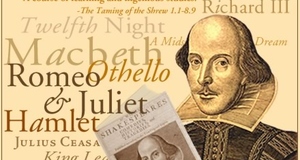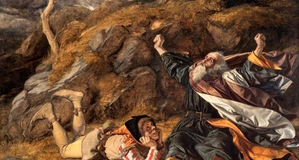Corruption and Theories of Kingship in Macbeth
By
2010, Vol. 2 No. 02 | pg. 1/1
KEYWORDS:
In England and Scotland, the notion of a king's divine right to rule gained leverage during the reign of King James I. In James’s The True Law of Free Monarchies, first published in 1598, he describes his philosophy concerning monarchy, suggesting that kings are higher beings who owe their kingship to the will of God. The nature of kingship in William Shakespeare’s 1606 play Macbeth reflects James’s theories through the unnatural events that occur following Macbeth’s unlawful rise to the throne. These events are a physical manifestation of the corruption that the couple enacts, a retribution for their murder of the divinely-appointed King Duncan and their subsequent usurpation of the throne. According to the theory of divine right, God bestows on kings the right to rule. As James I writes, kings “sit upon God his throne in the earth and have the count of their administration to give unto him” (par. 4). An uprising against the king, which James describes as “monstrous and unnatural,” is by extension an uprising against the will of God (par. 30). When Macbeth and Lady Macbeth murder Duncan, then, the England of James I would recognize this act as a rebellion against God and therefore as a perversion of the natural order. Their perversion of nature is reflected throughout the play; in Lady Macbeth’s ambiguous and anomalous gender, in the changes wrought in the landscape, in the sickness that begins to grip the couple’s minds, until finally the symbolic uprising of the land itself against their tyrannical rule restores the natural order that they have upset. Once Macbeth assumes the throne in Duncan’s place, he upsets the political and social order by taking a position that is not his by right. Macbeth is unable to be a good monarch because of his defiance of nature, and he commits further atrocities to keep himself on the throne: the murders of Banquo, Lady Macduff, and her son. James I writes in The True Law of Free Monarchies that the relationship of the king to his subjects may be compared “to a head of a body composed of divers members,” because the head cares for the body as the king does for his people, “preventing all euill that may come to the body or any part thereof” (par. 29). Macbeth cannot fulfill this role; he does not prevent evil but causes it. Another contemporary theory of kingship was the idea that “the realm is in the king, and the king in the realm” (Kantorowicz 223). If this is so, then the evil in Macbeth is represented by the changes that take place throughout his kingdom. The land begins to reflect this evil in its monarch through weird and supernatural occurrences. Soon after Duncan’s death, Ross notes that “by th’ clock ‘tis day / And yet dark night strangles the travelling lamp,” (2.4.6-7) the sun, as if the sky is “troubled with man’s act” (2.4.5). The land is shrouded in darkness, and is therefore barren, no longer fertile and healthy; nothing can grow without the light of the sun. The barrenness of the land is particularly significant following the unsexing of Lady Macbeth. She and Macbeth have no children, and cannot now that she has become unsexed; she asked the spirits to “make thick [her] blood” (1.5.41) and to “take [her] milk for gall;” (1.5.46) rendering her incapable of menstruation or of nursing a child. This is another kind of perversion; women were expected to raise children and especially heirs. Lady Macbeth has achieved her purpose, and Macbeth is now king, but as he laments, he has received “a fruitless crown” and “a barren sceptre” (3.1.62-63). The unnatural infertility of the couple themselves becomes manifest in the sunless landscape, which can hold life no more than Lady Macbeth herself can. Ross discusses other strange happenings with an old man: that “a falcon…was by a mousing owl hawked at and killed,” (2.4.12-13) and that Duncan’s horses “ate each other” (2.4.18) after turning “wild in nature…as they would make war with mankind” (2.4.16-18). The land no longer has a true king to care for it, only a murderous usurper who continues to kill. When Macbeth perverts nature and claims the throne, the land becomes sick as a result. Every creature is becoming as unnatural as Macbeth and his wife, as twisted as their foul deeds. Lady Macbeth finds, after a time, that she can no longer be unsexed and without remorse. She breaks down and becomes sick, as the land itself has become sick. She begins to sleepwalk, and while she does so she speaks aloud of her terrible deeds. Her affliction is foreshadowed by the voice Macbeth hears after murdering Duncan: “Sleep no more, Macbeth does murder sleep” (2.2.33-34). This mysterious occurrence hints that Lady Macbeth’s restlessness is due to the fact that she and Macbeth chose to murder Duncan while he was sleeping and defenseless. Having helped to murder a sleeping king—God’s servant on earth according to contemporary kingship theories—she herself is no longer able to sleep well, but paces her room and talks to herself. Sleep is, of course, a natural and necessary process. The doctor who comes to see her describes the sleepwalking as “a great perturbation in nature” (5.1.8). Lady Macbeth is no longer able to sleep restfully—because her conscience finally begins to trouble her and because this affliction is perhaps a form of divine punishment for her wickedness. James I notes that it is “the providence of God to stirre up such scourges as pleaseth him” to punish wicked kings (par. 45). And although she declared previously that water would easily wash the blood off her hands, she wrings her hands and mutters as she sleepwalks that her hands will never be clean, that “the smell of blood still” is on them (5.1.42). She is becoming sick in her mind because of what she has done. As the doctor concludes, “unnatural deeds do breed unnatural troubles” (5.1.61-62). Her attempt to strip herself of her gender has now failed because her conscience has returned; her attempt to overthrow the natural order is collapsing. Her apparent death by suicide—offstage and signaled by “the cry of women”—is her final unnatural act, a last crime against herself, according to contemporary values (5.5.8). Lady Macbeth can no longer live in the unstable world she has created for herself by trying to go against nature and divine will. Macbeth is unafraid of his own downfall, for a time, because of the witches’ misleading prophecies, but he knows that all is not well. He tells the doctor, “if thou couldst…cast / The water of my land, find her disease, / And purge it to a sound and pristine health, I would applaud thee” (5.3.52-55). He senses that there is something deeply wrong with his kingdom, but he does not know how to solve the problems he has created. The problem, of course, is Macbeth himself, and his corrupt kingship. But he persists in believing that no harm can come to him, as the witches have told him, “till Birnam Forest come to Dunsinane” (5.3.62) and that “no man that’s born of woman” will defeat him (5.3.6). He is confident because such events seem impossible—forests cannot move, and there is no man who does not have a mother. Macbeth claims that he will “never sag with doubt nor shake with fear” because neither part of the prophecy could ever occur (5.3.10). He mentions Birnam Forest over and over, in particular—saying he has nothing to fear until the forest comes to Dunsinane. But in the unnatural world that Macbeth has created, anything could be possible. Just after Lady Macbeth’s death—after she can no longer threaten the natural order—comes Macbeth’s undoing. A messenger arrives with this news: “I looked toward Birnam, and anon methought / The wood began to move” (5.5.32-33). What he sees is, in fact, soldiers camouflaged with leaves and twigs, but the symbolic significance of this event is worthy of examination. Macbeth has made the land diseased through his own corruption because he has murdered its divinely-ordained king and has assumed the throne for himself, and because he has become a tyrant, killing his subjects to maintain his power. When Macbeth hears the messenger’s words, it seems for a moment as if the ultimate revolt is taking place, as if the land itself is rising up against his unnatural reign. At this moment, he knows that the prophecy has been fulfilled, and he will be defeated. Although Macbeth and Lady Macbeth are powerful in their corruption, they are unable to fight against nature forever. Their sick deeds, manifested in the land, came back to haunt them literally as well as figuratively, ultimately leading to their separate demises in the form of divine retribution. Macbeth is defeated by the forces of Malcolm, who has never been with a woman, and Macduff, who “was from his mother’s womb / Untimely ripped” (5.10.15-16). Both men are untainted by the kind of corrupting force that Lady Macbeth had exerted on her husband. Malcolm becomes a monarch with the right to rule under James I’s theory of kingship, both because he is the son of Duncan, who was a true king, and because he has not murdered the innocent or otherwise gone against nature to gain his position. Malcolm is sanctioned by God, able to act as the head to his kingdom in a way that Macbeth cannot. With Macbeth’s death and Malcolm's ascension to the throne, the natural order is restored and the land can begin to heal itself under the guidance of a king who is capable of compassion and care for his kingdom.
James I. The True Law of Free Monarchies. 1598. Primary Source Documents. 20 Apr. 2007. Kantorowicz, Ernst H. The King's Two Bodies: a Study in Mediaeval Political Theology. Princeton: Princeton UP, 1957. Shakespeare, William. "Macbeth." The Norton Shakespeare. Ed. Stephen Greenblatt. New York: W. W. Norton & Company, 1997. 2555-2618. Suggested Reading from Inquiries Journal
Inquiries Journal provides undergraduate and graduate students around the world a platform for the wide dissemination of academic work over a range of core disciplines. Representing the work of students from hundreds of institutions around the globe, Inquiries Journal's large database of academic articles is completely free. Learn more | Blog | Submit Latest in Literature |
















